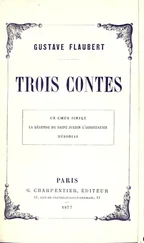Like its owners, the farm had an ancient appearance. The beams of the ceiling were mouldy, the walls black with smoke and the windows grey with dust. The oak sideboard was filled with all sorts of utensils, plates, pitchers, tin bowls, wolf–traps. The children laughed when they saw a huge syringe. There was not a tree in the yard that did not have mushrooms growing around its foot, or a bunch of mistletoe hanging in its branches. Several of the trees had been blown down, but they had started to grow in the middle and all were laden with quantities of apples. The thatched roofs, which were of unequal thickness, looked like brown velvet and could resist the fiercest gales. But the wagon–shed was fast crumbling to ruins. Madame Aubain said that she would attend to it, and then gave orders to have the horses saddled.
It took another thirty minutes to reach Trouville. The little caravan dismounted in order to pass Les Ecores, a cliff that overhangs the bay, and a few minutes later, at the end of the dock, they entered the yard of the Golden Lamb, an inn kept by Mother David.
During the first few days, Virginia felt stronger, owing to the change of air and the action of the sea–baths. She took them in her little chemise, as she had no bathing suit, and afterwards her nurse dressed her in the cabin of a customs officer, which was used for that purpose by other bathers.
In the afternoon, they would take the donkey and go to the Roches–Noires, near Hennequeville. The path led at first through undulating grounds, and thence to a plateau, where pastures and tilled fields alternated. At the edge of the road, mingling with the brambles, grew holly bushes, and here and there stood large dead trees whose branches traced zigzags upon the blue sky.
Ordinarily, they rested in a field facing the ocean, with Deauville on their left, and Havre on their right. The sea glittered brightly in the sun and was as smooth as a mirror, and so calm that they could scarcely distinguish its murmur; sparrows chirped joyfully and the immense canopy of heaven spread over it all. Madame Aubain brought out her sewing, and Virginia amused herself by braiding reeds; Felicite wove lavender blossoms, while Paul was bored and wished to go home.
Sometimes they crossed the Toucques in a boat, and started to hunt for sea–shells. The outgoing tide exposed star–fish and sea–urchins, and the children tried to catch the flakes of foam which the wind blew away. The sleepy waves lapping the sand unfurled themselves along the shore that extended as far as the eye could see, but where land began, it was limited by the downs which separated it from the "Swamp," a large meadow shaped like a hippodrome. When they went home that way, Trouville, on the slope of a hill below, grew larger and larger as they advanced, and, with all its houses of unequal height, seemed to spread out before them in a sort of giddy confusion.
When the heat was too oppressive, they remained in their rooms. The dazzling sunlight cast bars of light between the shutters. Not a sound in the village, not a soul on the sidewalk. This silence intensified the tranquility of everything. In the distance, the hammers of some calkers pounded the hull of a ship, and the sultry breeze brought them an odour of tar.
The principal diversion consisted in watching the return of the fishing–smacks. As soon as they passed the beacons, they began to ply to windward. The sails were lowered to one third of the masts, and with their fore–sails swelled up like balloons they glided over the waves and anchored in the middle of the harbour. Then they crept up alongside of the dock and the sailors threw the quivering fish over the side of the boat; a line of carts was waiting for them, and women with white caps sprang forward to receive the baskets and embrace their men–folk.
One day, one of them spoke to Felicite, who, after a little while, returned to the house gleefully. She had found one of her sisters, and presently Nastasie Barette, wife of Leroux, made her appearance, holding an infant in her arms, another child by the hand, while on her left was a little cabin–boy with his hands in his pockets and his cap on his ear.
At the end of fifteen minutes, Madame Aubain bade her go.
They always hung around the kitchen, or approached Felicite when she and the children were out walking. The husband, however, did not show himself.
Felicite developed a great fondness for them; she bought them a stove, some shirts and a blanket; it was evident that they exploited her. Her foolishness annoyed Madame Aubain, who, moreover did not like the nephew's familiarity, for he called her son "thou";—and, as Virginia began to cough and the season was over, she decided to return to Pont–l'Eveque.
Monsieur Bourais assisted her in the choice of a college. The one at Caen was considered the best. So Paul was sent away and bravely said good–bye to them all, for he was glad to go to live in a house where he would have boy companions.
Madame Aubain resigned herself to the separation from her son because it was unavoidable. Virginia brooded less and less over it. Felicite regretted the noise he made, but soon a new occupation diverted her mind; beginning from Christmas, she accompanied the little girl to her catechism lesson every day.
After she had made a curtsey at the threshold, she would walk up the aisle between the double lines of chairs, open Madame Aubain's pew, sit down and look around.
Girls and boys, the former on the right, the latter on the left–hand side of the church, filled the stalls of the choir; the priest stood beside the reading–desk; on one stained window of the side–aisle the Holy Ghost hovered over the Virgin; on another one, Mary knelt before the Child Jesus, and behind the altar, a wooden group represented Saint Michael felling the dragon.
The priest first read a condensed lesson of sacred history. Felicite evoked Paradise, the Flood, the Tower of Babel, the blazing cities, the dying nations, the shattered idols; and out of this she developed a great respect for the Almighty and a great fear of His wrath. Then, when she had listened to the Passion, she wept. Why had they crucified Him who loved little children, nourished the people, made the blind see, and who, out of humility, had wished to be born among the poor, in a stable? The sowings, the harvests, the wine–presses, all those familiar things which the Scriptures mention, formed a part of her life; the word of God sanctified them; and she loved the lambs with increased tenderness for the sake of the Lamb, and the doves because of the Holy Ghost.
She found it hard, however, to think of the latter as a person, for was it not a bird, a flame, and sometimes only a breath? Perhaps it is its light that at night hovers over swamps, its breath that propels the clouds, its voice that renders church–bells harmonious. And Felicite worshipped devoutly, while enjoying the coolness and the stillness of the church.
As for the dogma, she could not understand it and did not even try. The priest discoursed, the children recited, and she went to sleep, only to awaken with a start when they were leaving the church and their wooden shoes clattered on the stone pavement.
In this way, she learned her catechism, her religious education having been neglected in her youth; and thenceforth she imitated all Virginia's religious practices, fasted when she did, and went to confession with her. At the Corpus–Christi Day they both decorated an altar.
She worried in advance over Virginia's first communion. She fussed about the shoes, the rosary, the book and the gloves. With what nervousness she helped the mother dress the child!
During the entire ceremony, she felt anguished. Monsieur Bourais hid part of the choir from view, but directly in front of her, the flock of maidens, wearing white wreaths over their lowered veils, formed a snow–white field, and she recognised her darling by the slenderness of her neck and her devout attitude. The bell tinkled. All the heads bent and there was a silence. Then, at the peals of the organ the singers and the worshippers struck up the Agnes Dei; the boys' procession began; behind them came the girls. With clasped hands, they advanced step by step to the lighted altar, knelt at the first step, received one by one the Host, and returned to their seats in the same order. When Virginia's turn came, Felicite leaned forward to watch her, and through that imagination which springs from true affection, she at once became the child, whose face and dress became hers, whose heart beat in her bosom, and when Virginia opened her mouth and closed her lids, she did likewise and came very near fainting.
Читать дальше








![Гюстав Флобер - Закат Карфагена [Сборник]](/books/414440/gyustav-flober-zakat-karfagena-sbornik-thumb.webp)

